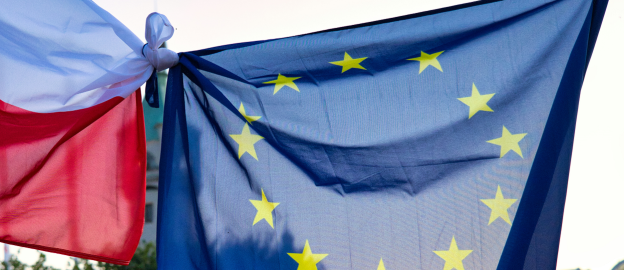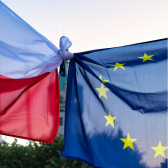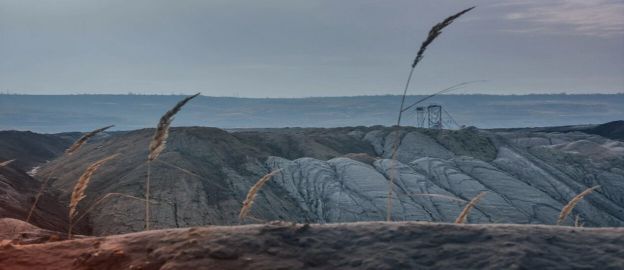Tag:
Regional cooperation
European Commission priorities for 2024-2029. The view from Poland on energy and climate

The upcoming European Parliament elections will open a new chapter in EU climate and energy policy. The new European Commission, which begins its 5-year term in the fall, will have to monitor the implementation of a wide range of files related to the ‘Fit for 55’ package and navigating the Union towards the 2050 goals by setting targets for 2040. It will also certainly propose a new political strategy, as the dynamics of the discussion in the EU is in a state of constant flux. From Poland’s perspective, what new priorities of the European Commission will be most important and gain support and interest?
35 minutes minutes
European Commission priorities for 2024-2029. The view from Poland on energy and climate
The upcoming European Parliament elections will open a new chapter in EU climate and energy policy. The new European Commission, which begins its 5-year term in the fall, will have to monitor the implementation of a wide range of files related to the ‘Fit for 55’ package and navigating the Union towards the 2050 goals by setting targets for 2040. It will also certainly propose a new political strategy, as the dynamics of the discussion in the EU is in a state of constant flux. From Poland’s perspective, what new priorities of the European Commission will be most important and gain support and interest?
35 minutes minutes

Energy in Belchatow After Lignite

Transitioning Europe's largest coal power plant to a secure, resilient, affordable clean energy future. New study outlines a transition plan for Europe’s largest coal-fired power plant, located in Belchatow, Poland.
7 minutes minutes
Energy in Belchatow After Lignite
Transitioning Europe's largest coal power plant to a secure, resilient, affordable clean energy future. New study outlines a transition plan for Europe’s largest coal-fired power plant, located in Belchatow, Poland.
7 minutes minutes

The end of energy resource imports from Russia?

On February 24, Russia started the Ukrainian war. Nothing will be the same again. Russia's brutal attack made the ongoing conflict around energy resources all the more obvious. In 2021 alone Russia could have earned PLN 500 billion (or $120 billion). from the export of energy resources. This revenue funds the Kremlin's military spending. Now we are considering whether giving up Russian fossil fuels is possible. Undoubtedly, this would be a radical solution with far-reaching and not entirely known consequences. If this were to happen, solidarity and close cooperation within the EU would be more important than ever before. In this article, we analyze what options Poland has to break its energy dependence on Russia.
17 minutes minutes
The end of energy resource imports from Russia?
On February 24, Russia started the Ukrainian war. Nothing will be the same again. Russia's brutal attack made the ongoing conflict around energy resources all the more obvious. In 2021 alone Russia could have earned PLN 500 billion (or $120 billion). from the export of energy resources. This revenue funds the Kremlin's military spending. Now we are considering whether giving up Russian fossil fuels is possible. Undoubtedly, this would be a radical solution with far-reaching and not entirely known consequences. If this were to happen, solidarity and close cooperation within the EU would be more important than ever before. In this article, we analyze what options Poland has to break its energy dependence on Russia.
17 minutes minutes

Small steps to big changes | Impact of the "Clean Energy..." package on power sector

We are starting to implement new EU energy regulations. Will the "Clean energy for all Europeans" package heal the Polish energy sector and give it an impulse for development? How can the energy consumer benefit from the changes? In Forum Energii's report "Small steps to big changes", we analyse the provisions of the Package and their consequences for Poland.
8 minutes minutes
Small steps to big changes | Impact of the "Clean Energy..." package on power sector
We are starting to implement new EU energy regulations. Will the "Clean energy for all Europeans" package heal the Polish energy sector and give it an impulse for development? How can the energy consumer benefit from the changes? In Forum Energii's report "Small steps to big changes", we analyse the provisions of the Package and their consequences for Poland.
8 minutes minutes

Risk preparedness in an integrated European electricity market

An integrated European electricity market will benefit consumers through lower prices, more cost-effective integration of renewable resources, and improved system reliability. A central question often asked in the context of the IEM is: can Poland rely on resources from neighbouring countries in a crisis situation? Is it safe to integrate market when national transmission system operators (TSOs) are responsible for managing energy systems in Europe.
5 minutes minutes
Risk preparedness in an integrated European electricity market
An integrated European electricity market will benefit consumers through lower prices, more cost-effective integration of renewable resources, and improved system reliability. A central question often asked in the context of the IEM is: can Poland rely on resources from neighbouring countries in a crisis situation? Is it safe to integrate market when national transmission system operators (TSOs) are responsible for managing energy systems in Europe.
5 minutes minutes

Options for integration of the Polish energy market within the European Union

Forum Energii examined how the integration of the energy market, one of the priorities of the European Union, will affect wholesale electricity prices in Poland. Depending on the option to integrate markets (with which country the merger takes place and what is its capacity), the wholesale price of electricity in Poland may fall by up to 5%, i.e. by about PLN 8 per MWh.
10 minutes minutes
Options for integration of the Polish energy market within the European Union
Forum Energii examined how the integration of the energy market, one of the priorities of the European Union, will affect wholesale electricity prices in Poland. Depending on the option to integrate markets (with which country the merger takes place and what is its capacity), the wholesale price of electricity in Poland may fall by up to 5%, i.e. by about PLN 8 per MWh.
10 minutes minutes
